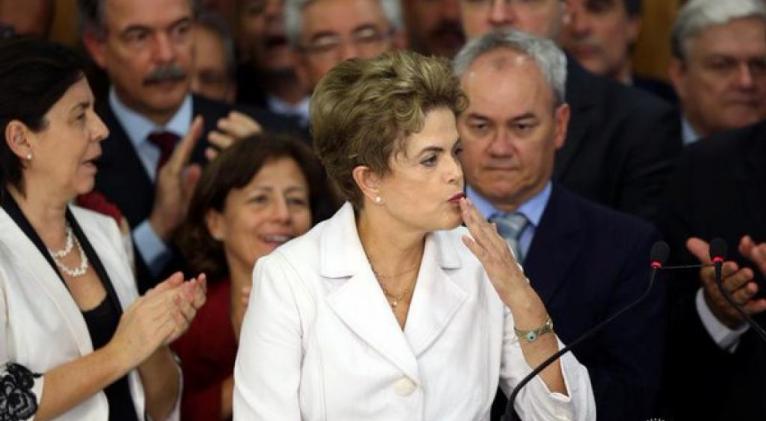Brazil's Rousseff bows out defiantly after historic Senate vote to try her
especiales

Rousseff, in office since 2011, will be replaced by Vice President Michel Temer, for the duration of a Senate trial that could take up to six months.
Rousseff, speaking shortly before she left Brasilia's Planalto presidential palace, said was notified of her suspension on Thursday morning.
"I may have made mistakes but I did not commit any crime," Rousseff said in an angry address, calling the impeachment "fraudulent" and "a coup." The leftist leader, 68, was flanked by dozens of ministers who were leaving with her administration.
"I never imagined that it would be necessary to fight once again against a coup in this country," Rousseff said, in a reference to her youth fighting Brazil's military dictatorship.
Her suspension came hours after the Senate voted 55-22 to put her on trial, a decision that ended more than 13 years of rule by the left-wing Workers Party.
The party rose from Brazil's labor movement and helped pull millions of people out of poverty before seeing many of its leaders tainted by corruption investigations.
Rousseff, an economist and former member of a Marxist guerrilla group who was the country's first woman president, is unlikely to be acquitted in her trial.
The size of the vote to try her showed the opposition already has the support it will need to reach a two-thirds majority required to convict Rousseff and remove her definitively from office.
"It is a bitter though necessary medicine," opposition Senator Jose Serra, tipped to become foreign minister under Temer, said during the marathon debate. "Having the Rousseff government continue would be a bigger tragedy."
With Brazil's economy mired in its deepest recession in decades, the incoming Temer administration sought to show it would act rapidly.
Temer aides said the incoming government would announce a series of austerity measures to help reduce a massive budget deficit. An immediate effort would seek to reform Brazil's costly pension system, possibly setting a minimum age for retirement, said one advisor.
Temer also plans to appoint Henrique Mereilles, a former central bank president and banking executive who is popular with foreign investors, as finance minister, another aide said.
As suspended head of state, Rousseff can continue to live in her official residence, have a staff and use an Air Force plane. She has denied any wrongdoing and repeatedly called the impeachment process a coup, and on Thursday vowed to keep fighting.
Rousseff dismissed her cabinet, including the sports minister, who is in final preparations for the Olympics in Rio de Janeiro in August, Brazil's Official Gazette showed. The central bank governor, who has ministerial rank, was not included in the decree.
Fireworks rang out in cities across Brazil after the vote that followed a 20-hour session in the Senate. Police briefly clashed with pro-Rousseff demonstrators in Brasilia during the vote, but the country was calm early Thursday, with scattered celebrants in São Paulo and other cities draping themselves in Brazil's green, yellow and blue flag.
ECONOMIC CHALLENGES
Temer, 75, a constitutional scholar who spent decades in Brazil's Congress, now faces the challenge of restoring economic growth and calm at a time when Brazilians, increasingly polarized, are questioning whether their institutions can deliver on his promise of stability.
In addition to the gaping deficit, equal to more than 10 percent of its annual economic output, Brazil is suffering from rising unemployment, plummeting investment and a projected economic contraction of more than 3 percent this year.
"Only major reforms can keep Brazil from moving from crisis to crisis," says Eduardo Giannetti da Fonseca, an economist and author in São Paulo who has written extensively about the country's socioeconomic problems.
But those changes, including an overhaul of pension, tax and labor laws and a political reform to streamline fragmented parties in a mercenary Congress, could remain elusive at a time of turmoil.
In a statement Thursday, Moody's Investors Service said continued political tension was likely to make reforms difficult. "Brazil still faces significant credit challenges including the need to reverse the ongoing economic contraction and to achieve meaningful fiscal consolidation," the ratings agency said.
(Additional reporting by Paulo Prada, Brad Brooks, Alonso Soto, Lisandra Paraguassy, Leonard Goy, Silvio Cascione and Guillermo Parra-Bernal.; Writing by Paulo Prada and Daniel Flynn; Editing by Kieran Murray and Frances Kerry)













Add new comment